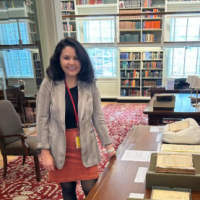
Gina Surita is History of Science Project Specialist at the American Philosophical Society. She completed her Ph.D. in History of Science at Princeton University, focusing on the history of the biomedical sciences (especially biochemistry). As part of the APS's new Center for the History of Science, Gina processes, interprets, curates tours/exhibits from, and answers reference inquiries relating to the APS's history of science collections.
